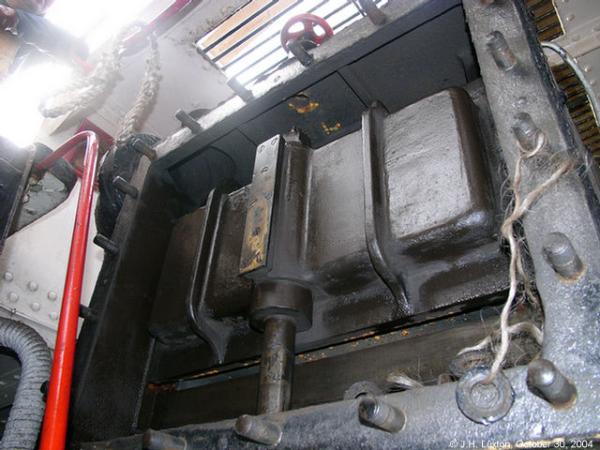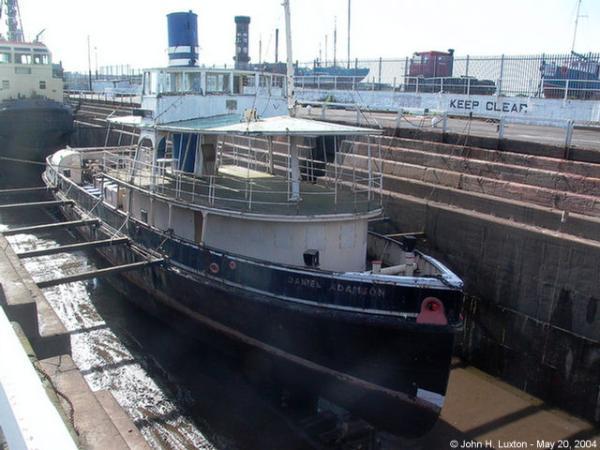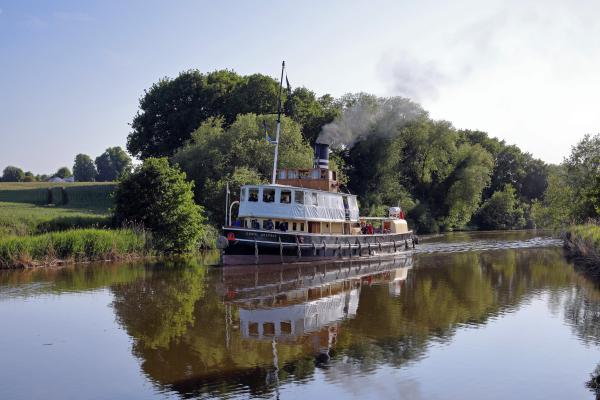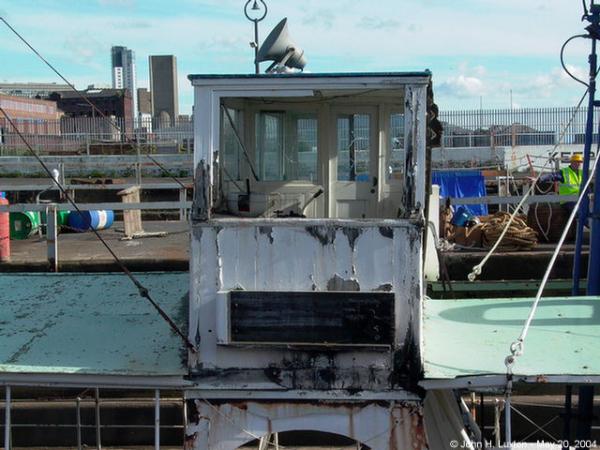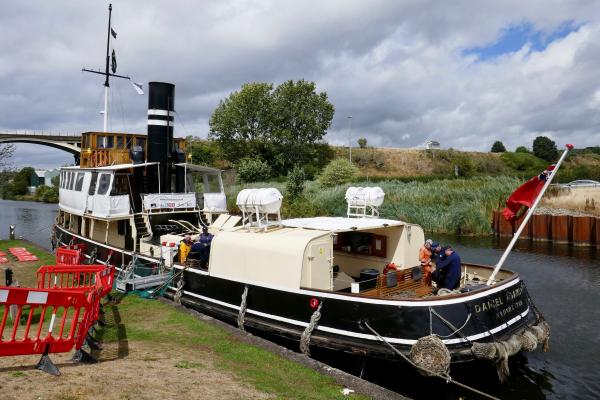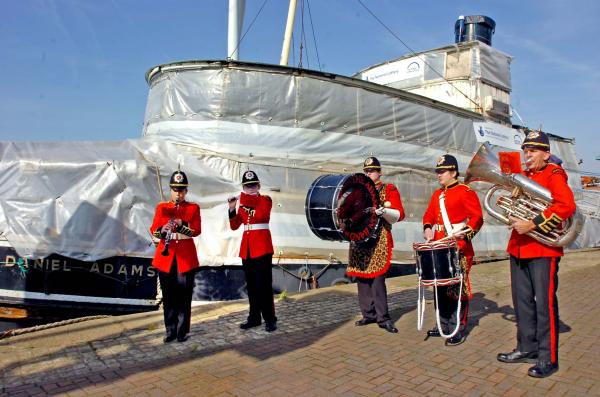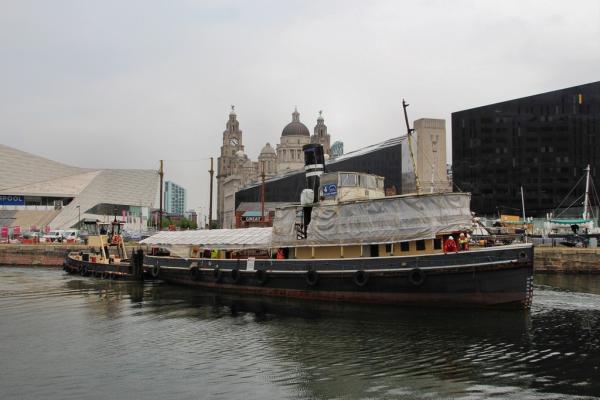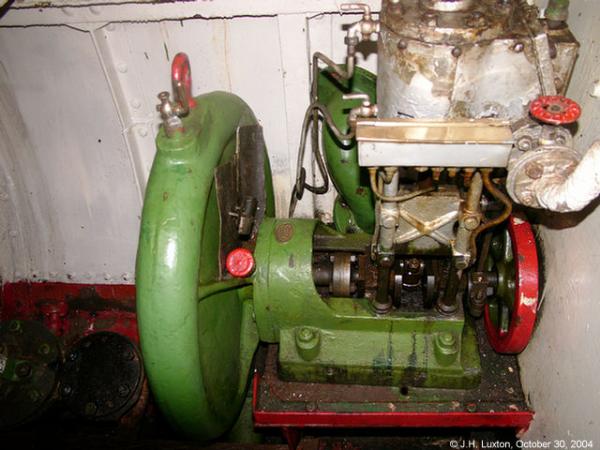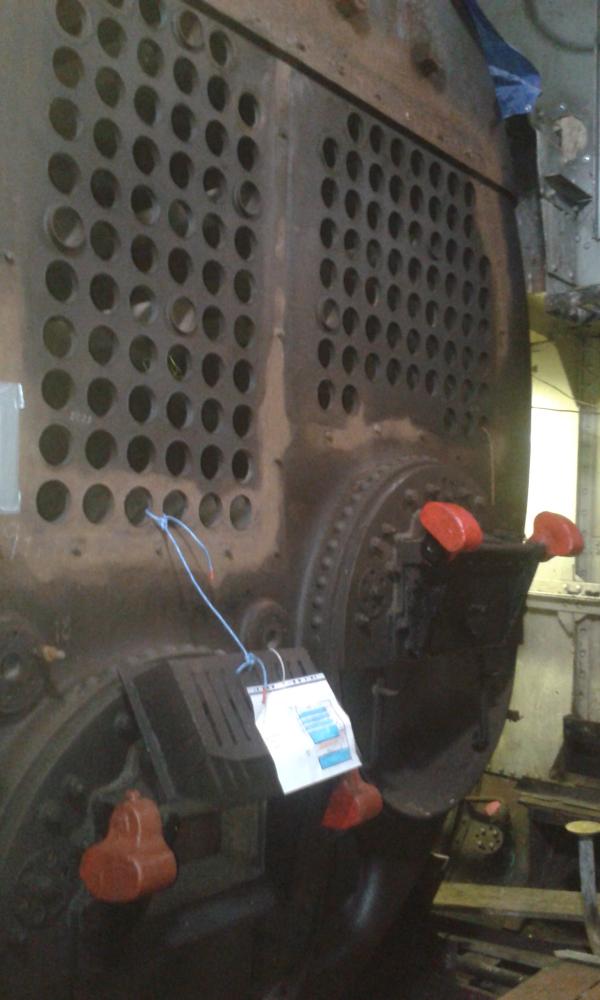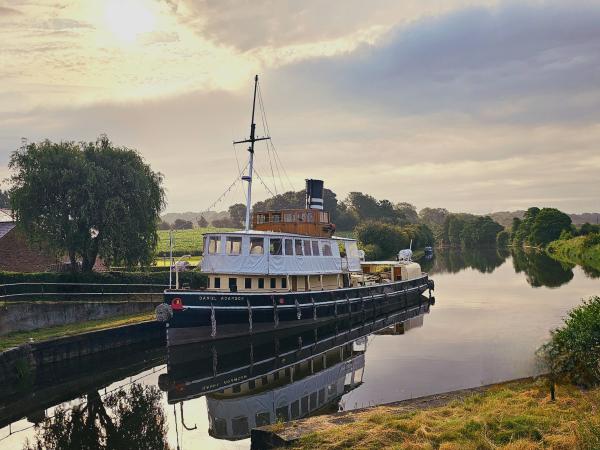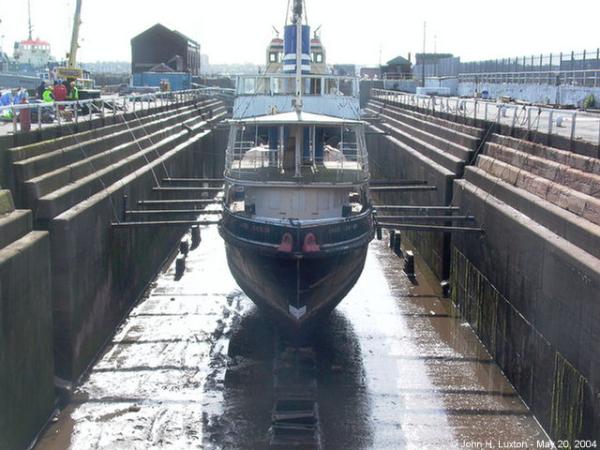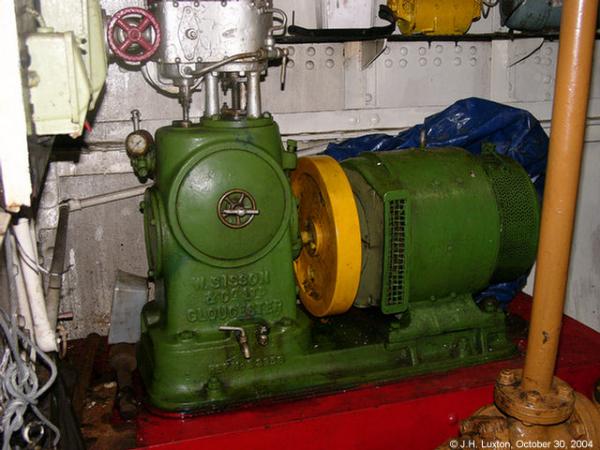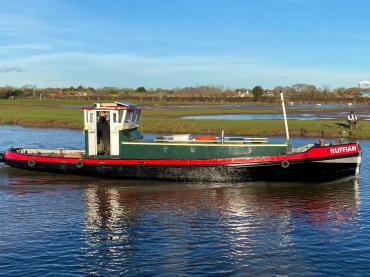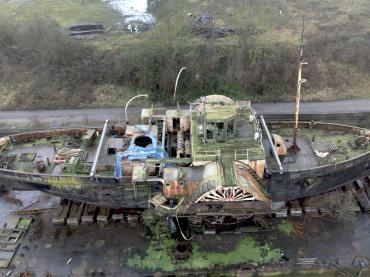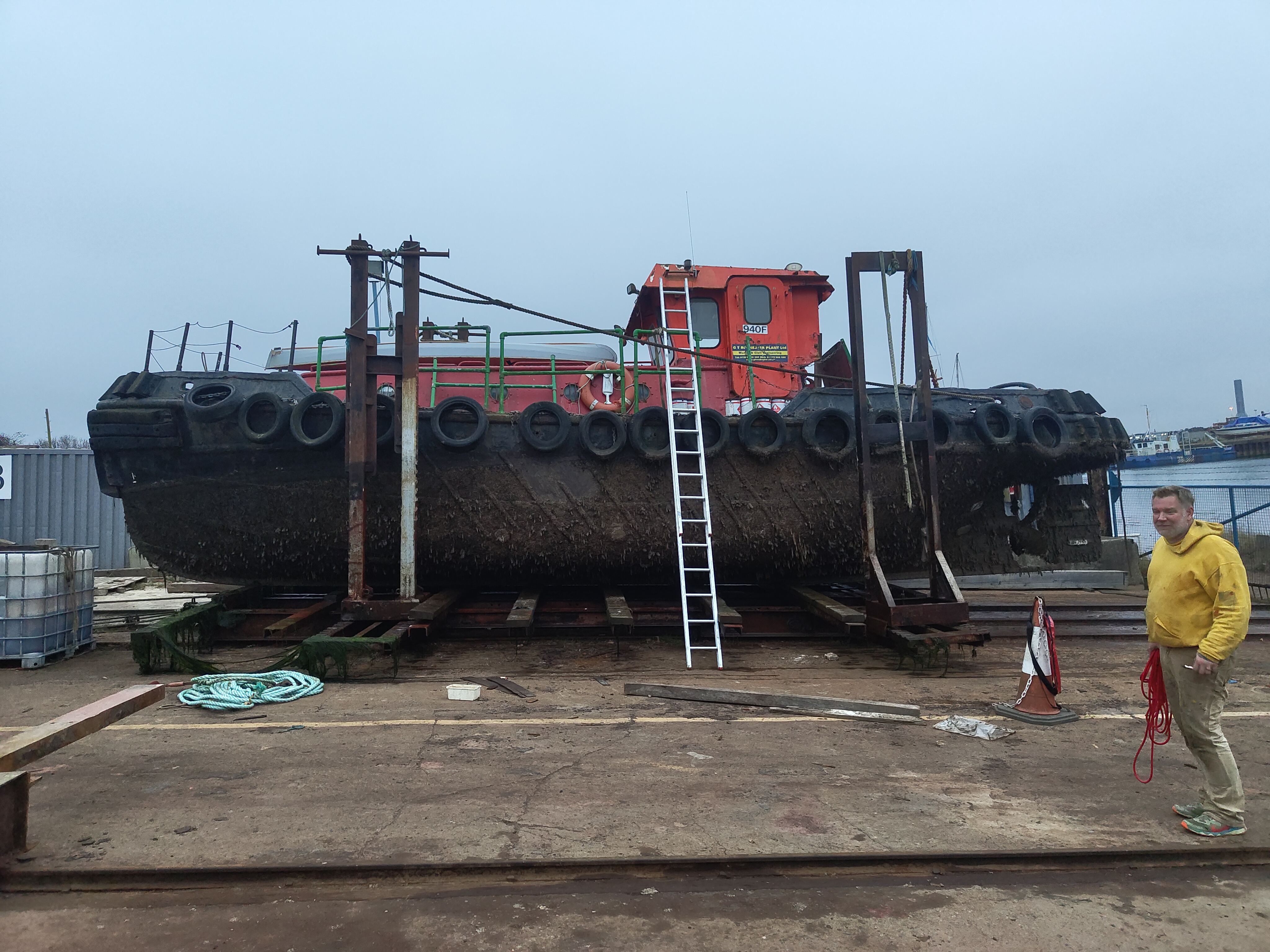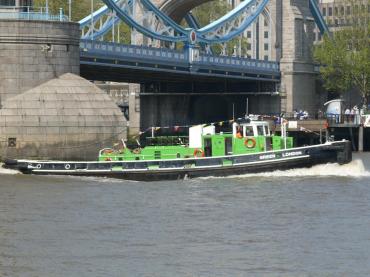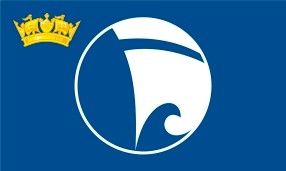
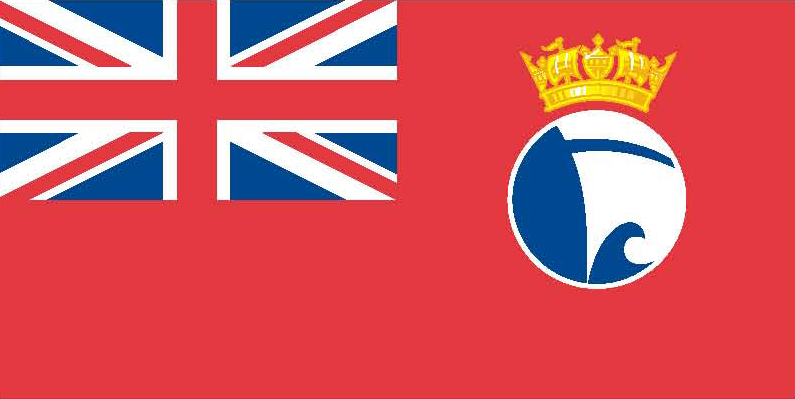
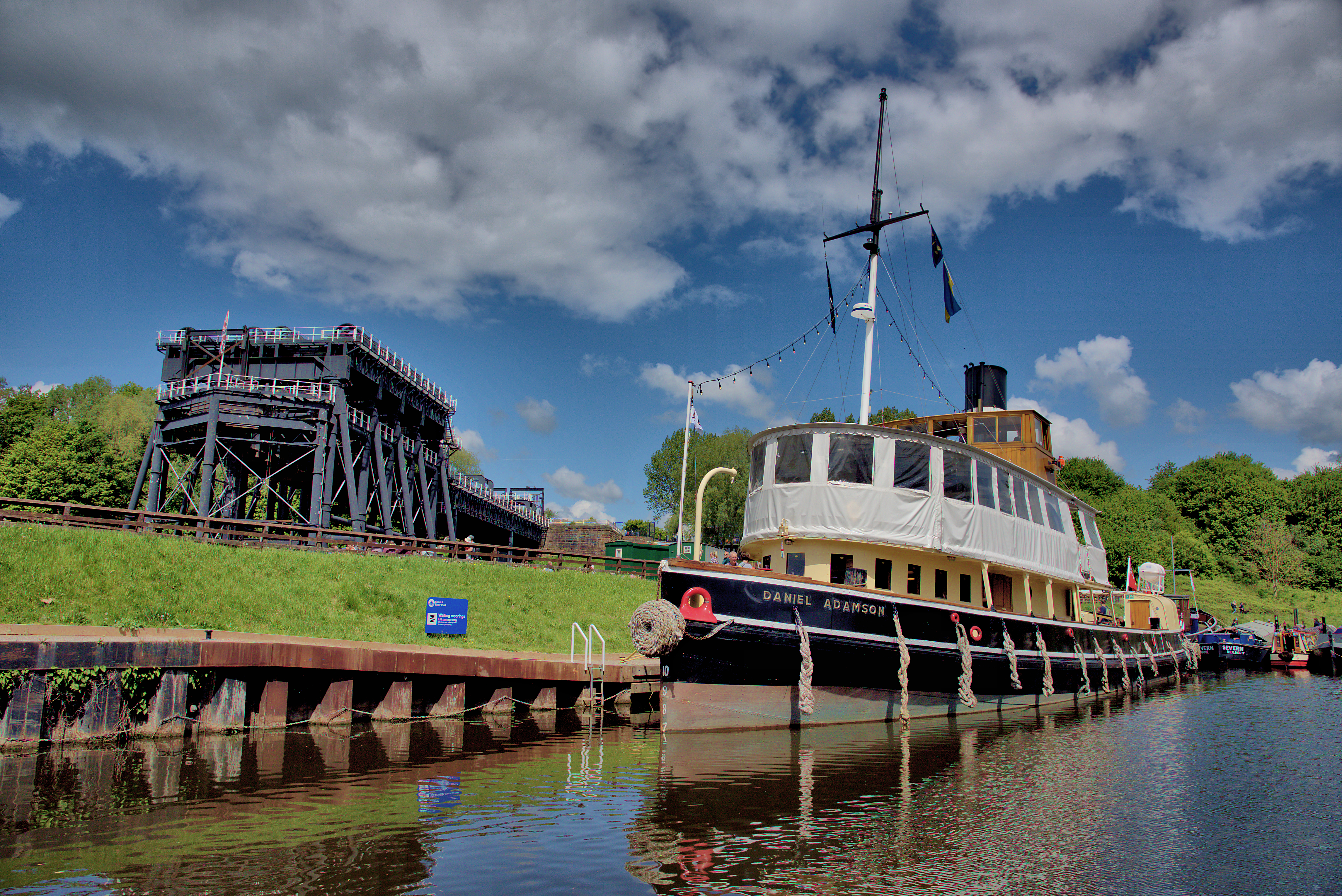
Previous names
- 1903 - 1936 Ralph Brocklebank
Details
Construction
Dimensions
History
DANIEL ADAMSON was constructed as RALPH BROCKLEBANK for the Shropshire Union Canal and Railway Company in 1903 by the Tranmere Bay Development Company. She was one of three new tug-tenders built in the first decade of the 20th Century to operate the S.U.C. & R. Co. barge towing service between Ellesmere Port and Liverpool. The passenger carrying capability of the tug-tenders facilitated the provision of a scheduled cross-river passenger service, something which the Shropshire Union company had provided on previous vessels since the 1880s. The combined passenger carrying and towage service continued until 1915. From then until 1921 DANIEL ADAMSON and her two sisters W.E. DORRINGTON and LORD STALBRIDGE operated as tugs only. The Manchester Ship Canal Company acquired the three vessels in 1921.
Whilst primarily used as tugs by the Manchester Ship Canal Company, the new owners made use of the tugs’ passenger accommodation again. Cruises from Manchester to Eastham were offered for 7/6d, 37.5p, inclusive of lunch and a return by train from Ellesmere Port. Following the scrapping of the MSC’s original tug-tender CHARLES GALLOWAY in 1929 the company further enhanced the passenger facilities by providing removable awnings fitted to the bridge and stern decks.
In 1936 further modifications were made to DANIEL ADAMSON with the bridge being raised to its present level. The passenger accommodation was also upgraded, with the interior being furnished in wood laminates and light fittings in the then contemporary art-deco style. Following the 1936 refit, the vessel was renamed DANIEL ADAMSON in honour of the Manchester Ship Canal Company’s first chairman. Though the activity of vandals over the past twenty years has served to remove some of the splendour of the passenger accommodation, the fine interior of the main and lower deck passenger saloons is still apparent, being more akin to that offered by liners of the period.
From 1936 to 1984, DANIEL ADAMSON operated both as a tug and as the company directors’ inspection vessel and a venue for corporate hospitality functions; the two sister vessels having been disposed of by the Manchester Ship Canal Company in 1937 and 1946.
In 1986 DANIEL ADAMSON was laid up and berthed in the ship dock at The Boat Museum, Ellesmere Port. In mid February 2004 local tug man Dan Cross discovered that she was about to be scrapped. Following a hastily arranged meeting and considerable efforts made by Dan the DANIEL ADAMSON cheated her appointment with the breakers. The Daniel Adamson Preservation Society arranged for the vessel to be towed from Ellesmere Port to Liverpool, where she was dry docked. Her hull was surveyed, grit blasted and painted enabling her to gain a 5-year seaworthiness certificate. In 2017 she was awarded an Engineering Heritage Award by the Institution of Mechanical Engineers following completion of her restoration to her original state.
In May 2025, the Daniel Adamson Preservation Society launched a fundraising campaign aiming to raise £150,000 for various essential updates, including lifesaving and fire-fighting equipment being updated and a 10-year boiler service.
Significance
What is the vessel’s ability to demonstrate history in her physical fabric?
Daniel Adamson was built in 1903 by the Tranmere Bay Development Co, Birkenhead and is a rare survivor of a very small group of dual-purpose tugs. The provision of passenger accommodation presented substantial design challenges in having to fulfil the requirement of substantial and robust towing power whilst at the same time providing roomy and luxurious accommodation for a large number of passengers. This resulted in her being a large tug with two decks, a gross tonnage of 173, a length overall of 110 ft (33.5m), a beam of 24.5 ft (7.47m), and a draught of 6 ft (1.83m).
Daniel Adamson was powered by two 2-cylinder compound steam engines supplied by a coal-fired Scotch Return Tube boiler generating 583 hp. This boiler was replaced first in 1921 and then again in 1956, with a boiler built by Kinkaid in Scotland which is still fitted today. She was propelled by twin screws, the two-engine design being very unusual at the time. Her bunkers originally held 28 tons of coal, although this was reduced to 21 tons in 1936. Her hull is of riveted steel.
Daniel Adamson’s basic fabric has been preserved with limited loss of originality as she has been subject to significant adaptation and reconstruction over the years. In 1929 her passenger facilities were enhanced by the provision of removable awnings to bridge and stern decks. In 1936 further modifications were made, with the bridge being raised. Passenger accommodation was upgraded, with the interior being furnished in wood laminates and art-deco style light fittings installed.
Daniel Adamson was withdrawn from service in 1984 when arrangements were made to move her to Ellesmere Port Boat Museum where she remained until 2004, when the decision was taken to have her broken up. The Daniel Adamson Preservation Society was formed to rescue her. Heritage Lottery Funding in 2012 enabled a full restoration programme to be carried out at Cammel Laird’s.
What are the vessel’s associational links for which there is no physical evidence?
Daniel Adamson was built in 1903 as Ralph Brocklebank for the Shropshire Union Canal and Railway Company (S.U.C. & R. Co.) by the Tranmere Bay Development Company. She was one of three new tug-tenders built to operate the S.U.C. & R. Co.’s barge towing service between Ellesmere Port and Liverpool. Her passenger-carrying capability facilitated the provision of a scheduled cross-river passenger service. Her combined passenger-carrying and towage service continued until 1915. From then until 1921 she operated as a tug only.
In 1921 Daniel Adamson was acquired by the Manchester Ship Canal Company. She was primarily used as a tug on the Canal, although the new owners made use of her passenger accommodation by offering cruises to the public from Manchester to Eastham with return by train from Ellesmere Port. In 1929 the company enhanced the passenger facilities, and in 1936 further modifications were made with the bridge being raised and the passenger accommodation upgraded.
Following the 1936 refit, she was renamed Daniel Adamson in honour of the Manchester Ship Canal Company’s first chairman. From 1936 to 1984, she operated both as a tug and as the company directors’ inspection vessel and a venue for corporate hospitality functions. In 1986 she was taken out of service, laid up, and berthed in the ship dock at The Boat Museum, Ellesmere Port, where she remained as a static exhibit until 2004.
In February 2004 a local tug skipper, Dan Cross, discovered that she was about to be scrapped and made arrangements for her to be saved. The Daniel Adamson Preservation Society arranged for the vessel to be towed from Ellesmere Port to Liverpool, where she was dry docked. Her hull was surveyed, grit blasted and painted enabling her to gain a 5-year seaworthiness certificate. In 2017 she was awarded an Engineering Heritage Award by the Institution of Mechanical Engineers following completion of her restoration to her original state.
Daniel Adamson was recorded on the National Register of Historic Vessels in 1996 and is a member of the National Historic Fleet.
How does the vessel’s shape or form combine and contribute to her function?
Daniel Adamson was one of only two tug/tenders to survive in the UK (the other being Calshot which has since been deconstructed and is now Archived) and the only one to retain her original steam power. She is now the last surviving original, operational, coal-fired, twin screw, steam tug-tender in the UK. As such she is of national importance. She is subject to a regular maintenance programme and operates a full passenger programme in steam during the summer months.
Being built as a dual-purpose river tug Daniel Adamson was required to combine both power and attractive appearance. As a steam tug her powerful engine and her thick riveted steel hull enabled her to fully carry out her towing duties. As a vessel with a luxuriously fitted lounge area she was very attractive to passengers. Her design therefore meant that she was well-fitted for both of her intended purposes. Today the vessel is in excellent condition. The fine interior of the main and lower deck passenger saloons is still apparent, being similar to that offered by liners of the period.
Aesthetically, Daniel Adamson has extremely pleasing lines, sitting tall in the water like a miniature liner placed on a large river tug. Unlike most tugs, she was not built solely for practicality, and since her role in carrying passengers was an essential part of her original design aesthetic appearance was important from the beginning. Her black hull and her single black funnel with two white stripes are a familiar site to many people living around the River Mersey and north Cheshire.
Sources:
Paul Brown, Historic Ships: The Survivors (Amberley, 2010), 65-66.
Brouwer, Norman J, International Register of Historic Ships (Anthony Nelson, 1993), 82.
Steamboat Register: An illustrated Register of surviving steam vessels in the British Isles
(Steam Boat Association of Great Britain, 1994).
Michael Clarke, “Still in Steam: Tug DANIEL ADAMSON”, Ships Monthly (December 2012), 17.
Key dates
-
1903
Vessel built by Tranmere Bay Development Company in Birkenhead and named RALPH BROCKLEBANK
-
1921
Purchased by Manchester Ship Canal Company where she worked as stern tug, as well as taking Ship Canal employees on trips from Manchester to Eastam
-
1936
A new superstructure was fitted, the bridge raised and passenger accommodation improved Vessel renamed DANIEL ADAMSON after the first Chairman of the Ship Canal Co
-
1936-1984
Vessel operated as a tug, the company directors’ inspection vessel and a venue for corporate hospitality
-
1984
Vessel retired from operating and became a static exhibit at the Boat Museum, Ellesmere Port
-
2004
February: decision was taken to have her broken up but vessel was rescued and the Daniel Adamson Preservation Society was formed
-
2004
Vessel towed from Ellesmere Port to Liverpool, where she was dry docked Hull surveyed, grit blasted and painted enabling her to gain a 5 year seaworthiness certificate
-
2012
Heritage Lottery Fund approved a first-round pass for a £3m bid, including development funding of £37,300
-
Dec 2017
The Daniel Adamson Steam Ship is presented with the Engineering Heritage Award by the Institution of Mechanical Engineers
Grants
-
June 2023
Awarded a £98,978 grant from The National Lottery Heritage Fund to set up a project connecting young people with the maritime heritage of Liverpool.
-
April 2022
Awarded £9,827 from the Arts Council's Let's Create Jubilee Fund for the Queen's Platinum Jubilee in June 2022.
-
2021
Awarded £50,000 from the 2nd round of Culture Recovery Funding
-
October 2020
Daniel Adamson Preservation Society received a grant of £151,000 from round 1 of the Culture Recovery Fund.
-
2017
A Project grant of £250 for being one of our Regional Flagship Winner for Mersey 2017 was made from the Strategic Development Fund of National Historic Ship Uk
-
2012
A Sustainability Grant of £1000 for consultancy was made from the Strategic Development Fund of National Historic Ships UK
-
2009-2010
A grant was awarded to the Trust for £8,500 by the PRISM Fund
-
2007/08
The Heritage Lottery Fund awarded £37,300 to produce further and more detailed plans for restoration
-
2007/08
The Heritage Lottery Fund awarded £24,300 for more detailed plans
-
2004-2006
A grant was awarded to the Society by the PRISM Fund for £3500
-
2006-2007
A grant was awarded by the PRISM Fund for £8000
-
2005/06
The Heritage Lottery Fund awarded £50,000 to determine what work will be required
Sources
Brouwer, Norman J, International Register of Historic Ships Anthony Nelson, pp146, Edition 2, 1993
Steamboat Register: An illustrated Register of surviving steam vessels in the British Isles, Steam Boat Association of Great Britain, May Edition 6, 1994
The Boat Museum, The Boat Museum
Classic Boat 3m for steam tug tender, pp17, December 2012
Clarke, Michael, Ships Monthly Still in Steam: Tug DANIEL ADAMSON, pp18-20, April Still in Steam, 1977
The Transport Trust: AGM Weekend - Liverpool & Birkenhead, Edition 103, 2011
Own this vessel?
If you are the owner of this vessel and would like to provide more details or updated information, please contact info@nationalhistoricships.org.uk

